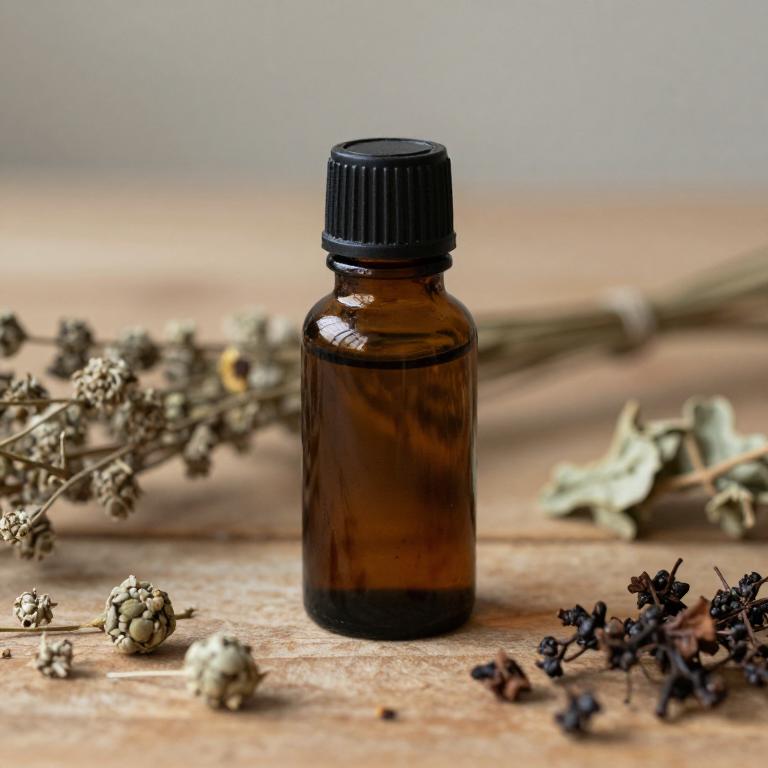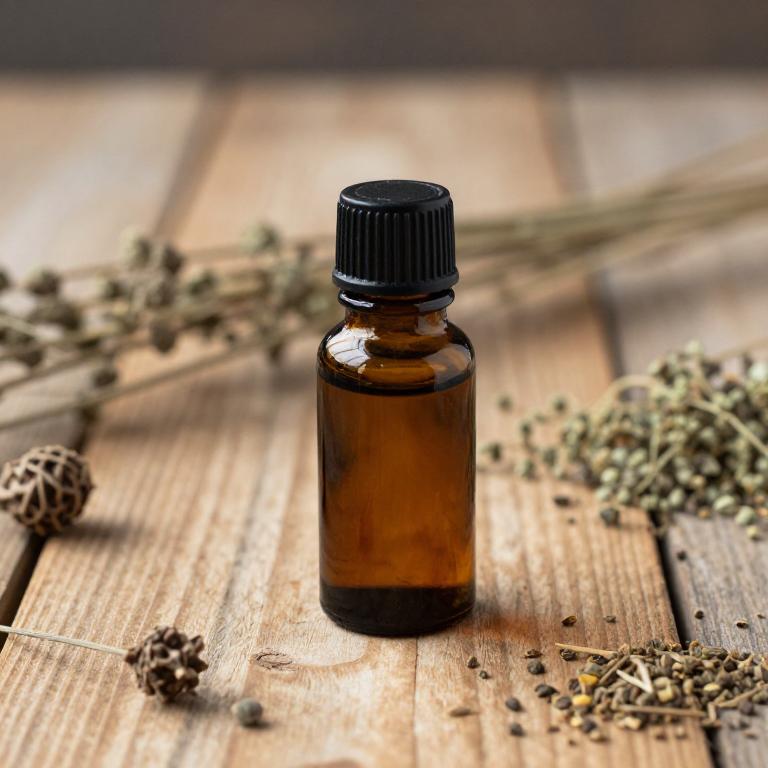10 Best Herbal Essential Oils For Stomach Pain

Herbal essential oils have been traditionally used to alleviate stomach pain due to their soothing and anti-inflammatory properties.
Oils such as peppermint, ginger, and fennel are commonly recommended for their ability to relax gastrointestinal muscles and reduce cramping. When diluted properly with a carrier oil, these essential oils can be applied topically to the abdomen or inhaled to provide relief from digestive discomfort. They are often used in aromatherapy and massage to ease symptoms of indigestion, bloating, and nausea.
However, it is important to consult with a healthcare professional before using essential oils, especially for individuals with existing medical conditions or those taking medications.
Table of Contents
- 1. Turmeric (Curcuma longa)
- 2. Black pepper (Piper nigrum)
- 3. Ginger (Zingiber officinale)
- 4. Fennel (Foeniculum vulgare)
- 5. English lavender (Lavandula angustifolia)
- 6. Chamomile (Matricaria chamomilla)
- 7. Ceylon cinnamon (Cinnamomum zeylanicum)
- 8. Licorice (Glycyrrhiza glabra)
- 9. Cumin (Cuminum cyminum)
- 10. Peppermint (Mentha piperita)
1. Turmeric (Curcuma longa)

Curcuma longa, commonly known as turmeric, contains essential oils that have been traditionally used for their anti-inflammatory and digestive benefits.
These essential oils, derived from the rhizomes of the plant, may help alleviate stomach pain by reducing inflammation in the gastrointestinal tract. The active compounds in curcuma longa, such as curcumin, are believed to support gut health and ease symptoms of indigestion and bloating. While research is ongoing, some studies suggest that these oils may have a calming effect on the digestive system.
However, it is important to consult a healthcare professional before using curcuma longa essential oils for persistent stomach pain, as they may interact with certain medications or conditions.
2. Black pepper (Piper nigrum)

Piper nigrum, commonly known as black pepper, contains essential oils that have been traditionally used for their potential digestive benefits.
The essential oils derived from black pepper, including compounds like piperine, may help alleviate stomach pain by stimulating the digestive system and improving the absorption of nutrients. These oils can act as a mild carminative, helping to reduce gas and bloating that often contribute to discomfort. However, it is important to use these oils cautiously, as they can be potent and may cause irritation if not diluted properly.
Always consult with a healthcare professional before using black pepper essential oils for stomach pain, especially if you have existing health conditions or are pregnant.
3. Ginger (Zingiber officinale)

Zingiber officinale, commonly known as ginger, is widely used in herbal medicine for its essential oils, which possess potent anti-inflammatory and analgesic properties.
These essential oils are derived from the dried root of the plant through steam distillation, capturing the aromatic compounds responsible for ginger's distinctive flavor and therapeutic effects. Studies suggest that ginger essential oils may help alleviate stomach pain by reducing intestinal spasms and decreasing gastric inflammation. The active compounds, such as gingerol and shogaol, are believed to interact with the body's pain receptors and promote digestive comfort.
However, it is important to use these oils under professional guidance to ensure safe and effective application for stomach-related ailments.
4. Fennel (Foeniculum vulgare)

Foeniculum vulgare, commonly known as fennel, is a herb widely used in aromatherapy for its soothing effects on the digestive system.
The essential oil extracted from its seeds contains compounds like anethole, which have mild carminative and antispasmodic properties that can help relieve stomach pain and bloating. This oil is often used in massage or diffused in the air to ease digestive discomfort and reduce gas. Its gentle nature makes it suitable for internal use when diluted properly, though it should be used cautiously during pregnancy.
Overall, fennel essential oil offers a natural and effective remedy for mild stomach issues when used appropriately.
5. English lavender (Lavandula angustifolia)

Lavandula angustifolia, commonly known as English lavender, is widely recognized for its calming and therapeutic properties, including its use in alleviating stomach pain.
The essential oil extracted from its flowers contains compounds such as linalool and linalyl acetate, which have anti-inflammatory and antispasmodic effects that can help reduce gastrointestinal discomfort. When diluted properly, lavender essential oil can be applied topically to the abdomen or inhaled to ease cramping and bloating associated with digestive issues. It is often used in aromatherapy and massage therapies to provide relief from stress-related stomach upset.
However, it should always be used with caution and under the guidance of a healthcare professional, especially for individuals with known allergies or medical conditions.
6. Chamomile (Matricaria chamomilla)

Matricaria chamomilla, commonly known as German chamomile, is a widely used herb in aromatherapy and herbal medicine for its calming and anti-inflammatory properties.
The essential oil derived from its flowers is particularly effective in alleviating stomach pain due to its ability to reduce intestinal spasms and soothe digestive tract irritation. It contains active compounds such as bisabolol and chamazulene, which have strong anti-inflammatory and antispasmodic effects. When used in massage or diffused into the air, chamomile essential oil can help relieve cramping and promote a sense of relaxation, aiding in the overall healing of the digestive system.
However, it is important to use this essential oil with caution, as it may interact with certain medications and should always be diluted before application.
7. Ceylon cinnamon (Cinnamomum zeylanicum)

Cinnamomum zeylanicum, commonly known as cinnamon, is a popular herb used in aromatherapy for its soothing properties.
The essential oil derived from its bark contains compounds like cinnamaldehyde, which have anti-inflammatory and antispasmodic effects. When used in aromatherapy, cinnamon essential oil may help alleviate stomach pain by reducing inflammation and easing digestive discomfort. It is often diffused or diluted and applied topically to the abdomen for its calming and healing benefits.
However, it is important to consult a healthcare professional before using cinnamon oil, especially for persistent or severe stomach issues.
8. Licorice (Glycyrrhiza glabra)

Glycyrrhiza glabra, commonly known as licorice, contains essential oils that have been traditionally used to alleviate stomach pain due to their anti-inflammatory and soothing properties.
These oils help reduce irritation in the gastrointestinal tract by calming spasms and decreasing inflammation, making them beneficial for conditions like gastritis or indigestion. The compounds in licorice essential oils, such as glycyrrhizin, may also support the protective mucus layer of the stomach lining. However, prolonged use of licorice can lead to side effects like hypertension, so it should be used under professional guidance.
Overall, licorice essential oils offer a natural alternative for managing mild to moderate stomach discomfort when used appropriately.
9. Cumin (Cuminum cyminum)

Cuminum cyminum, commonly known as cumin, is a herb widely used in traditional medicine for its essential oils, which are believed to offer relief from stomach pain.
The essential oil of cumin contains compounds like cuminaldehyde and limonene, which have carminative and antispasmodic properties that can help soothe digestive discomfort. When used in aromatherapy or applied topically, cumin essential oil may reduce bloating, gas, and cramping by relaxing the muscles of the gastrointestinal tract. However, it is important to dilute the oil properly before use to avoid skin irritation.
While cumin essential oil may provide natural relief for mild stomach issues, it should not replace professional medical advice for persistent or severe digestive problems.
10. Peppermint (Mentha piperita)

Mentha piperita, commonly known as peppermint, is a popular herb used in the production of essential oils that are often employed for digestive discomfort.
The essential oil of peppermint contains potent compounds like menthol and menthone, which have been shown to relax the muscles of the gastrointestinal tract, thereby alleviating symptoms of stomach pain and cramping. When used in aromatherapy or applied topically, peppermint oil can help reduce bloating, nausea, and indigestion by stimulating the release of digestive enzymes. However, it is important to dilute the oil properly before use, as undiluted peppermint oil may cause skin irritation or allergic reactions.
Overall, peppermint essential oil is a natural remedy that can provide relief for mild stomach pain when used safely and appropriately.